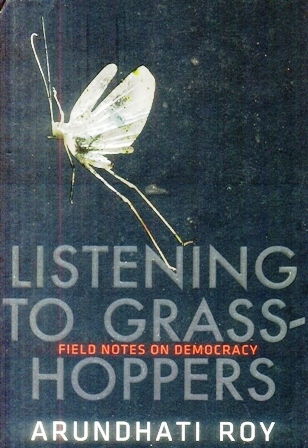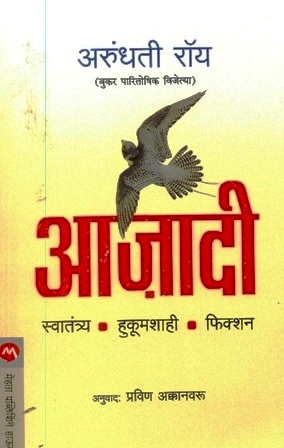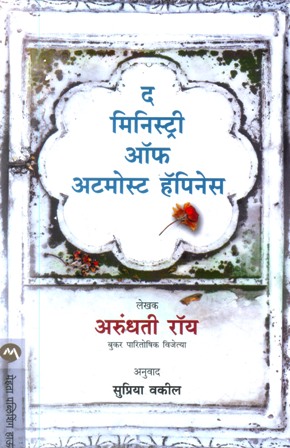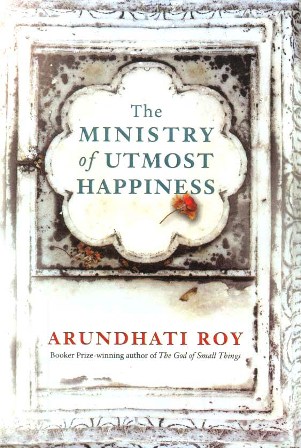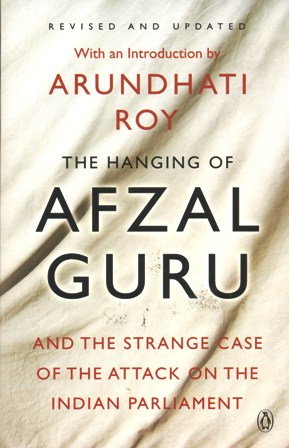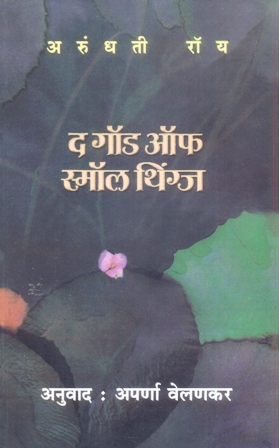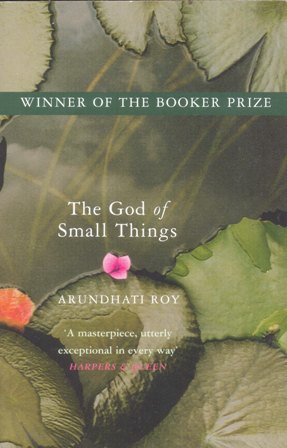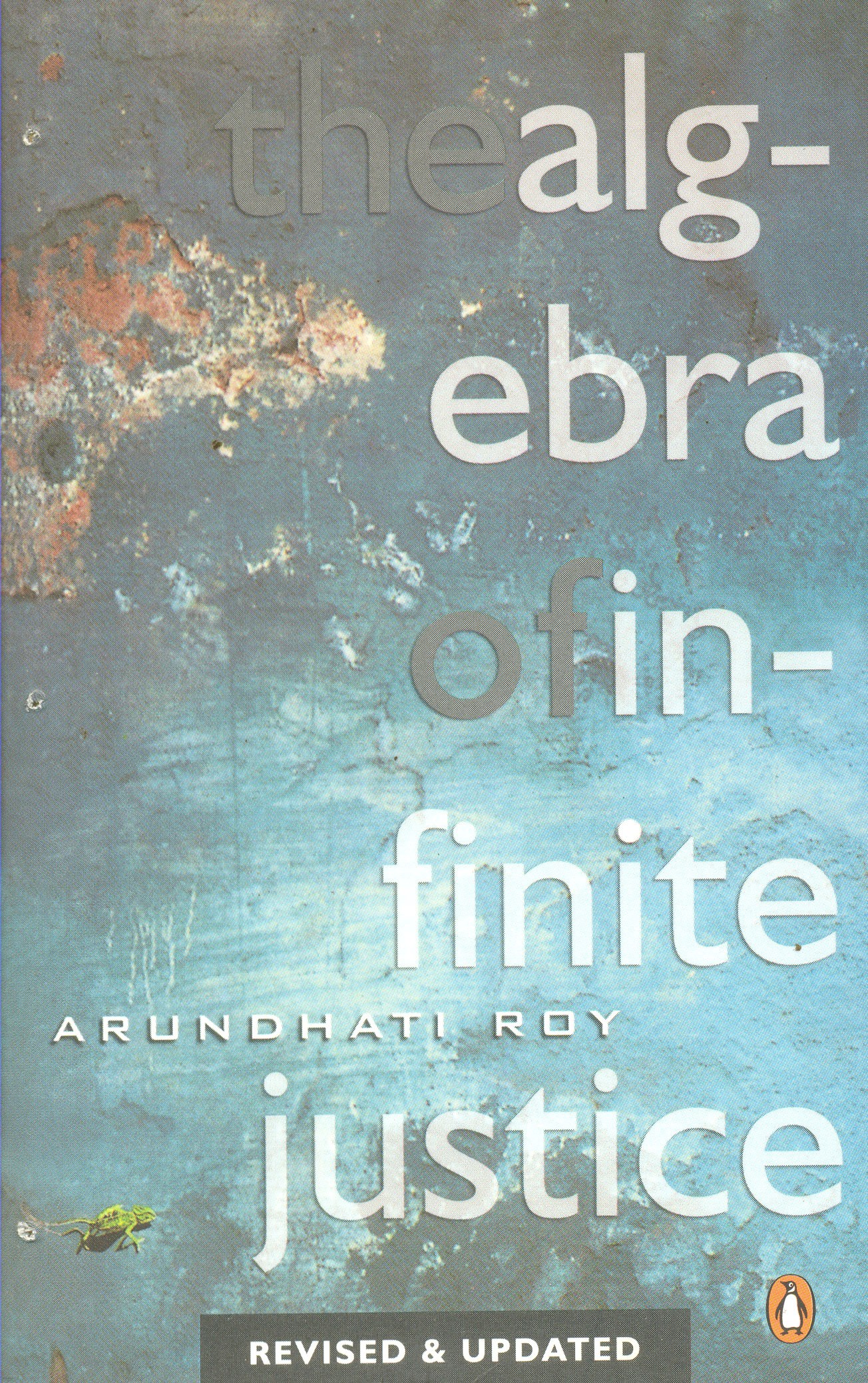-
Listening To Grass Hoppers
Combining brilliant political insight and razor-sharp prose, Arundhati Roy in these essays, takes a hard look at the underbelly of the world’s largest democracy, and shows how the journey that Hindu nationalism and neoliberal economic reforms began together in the early 1990s is unraveling in dangerous ways. Beginning with the state-backed killing of Muslims in Gujarat in 2002, she writes about how ‘progress’ and genocide have historically gone hand in hand; about the murky investigations into the 2001 attack on the Indian Parliament; about the dangers of an increasingly powerful and entirely unaccountable judiciary; and about the collusion between large corporations, the government and the mainstream media. The collection ends with an account of the August 2008 uprising in Kashmir and an analysis of the November 2008 attacks on Mumbai. ‘The Briefing’, included as an appendix, is a fictional text that brings together many of the issues central to the collection. As it tracks the fault-lines that threaten to destroy India’s precarious future, Listening to Grasshoppers asks fundamental questions about democracy itself, a political system that has, by virtue of being considered ‘the best available option’, been put beyond doubt and correction.
-
Azadi (आझादी)
डोळ्यांत अंजन घालणाऱ्या या निबंधांमधून अरुंधती रॉय अधिकारशाही वृद्धिंगत होत असलेल्या या जगात स्वातंत्र्याचा अर्थ चाचपून पाहण्यासाठी आपल्याला उद्युक्त करतात. या निबंधांमध्ये सार्वजनिक तसेच खासगी भाषा आणि या अस्वस्थ कालखंडात फिक्शनसह इतर पर्यायी कल्पनांची नेमकी कोणती भूमिका असावी, याविषयीच्या चिंतनाचा समावेश आहे. रॉय म्हणतात, की ही जागतिक साथ म्हणजे दोन जगांच्या दरम्यान असलेले एक प्रवेशद्वार आहे. या साथीमुळे आरोग्याची आणि इतरही अपरिमित हानी झालेली असली, तरी तिने मनुष्यजातीला एक सुवर्णसंधी उपलब्ध करून दिली आहे. नव्या जगाची कल्पना करण्याचे आपल्या सगळ्यांना मिळालेले हे निमंत्रण आहे.
-
The Ministry Of Utmost Happiness (द मिनिस्ट्री ऑफ
जुन्या दिल्लीपासून ते काश्मीरमधील पर्वतराजींपर्यंत आणि महानगराच्या विराट रूपापासून ते दूरवरच्या जंगलापर्यंत... वेगवेगळ्या आयुष्यांचे अनेकरंगी पदर उलगडून दाखवणारी ही विलक्षण कादंबरी आहे. शहरातील एका कब्रस्तानात ‘घर’वसवणारी अन्जुम आणि तिच्या परिघातील पात्रे, एका रात्री फुटपाथवर अचानक प्रकट झालेली एक बालिका, एस. तिलोत्तमा आणि तिच्यावर प्रेम करणारे तीन पुरुष... या साऱ्यांच्या आयुष्याभोवती फिरणारी ही कादंबरी वाचकाला विविध भावभावनांचं उत्कट दर्शन घडवते.
-
The Ministry of Utmost Happiness
A gem a great tempest of a novel: a remarkable creation, a story both intimate and international, swelling with comedy and outrage, a tale that cradles the world s most fragile people even while it assaults brutal villains. Ministry is a thoroughly absorbing work of art a hybrid of satire, romance, thriller and history. It speaks to the universal struggle of minority people to be free. Here is writing that swirls so hypnotically it doesn t feel like words on paper so much as ink on water. This vast novel will leave you awed by the heat of its anger and the depth of its compassion. Ron Charles, The Washington Post Ministry is the follow-up weve been longing for a poetic, densely populated contemporary novel in the tradition of Dickens and Tolstoy. From its beginning, one is swept up in the story. If The God of Small Things was a lushly imagined, intimate family novel slashed through with politics, Ministry encompasses wildly different economic, religious, and cultural realms across the Indian subcontinent and as far away as Iraq and California. Animating it is a kaleidoscopic variety of bohemians, revolutionaries, and lovers...With her exquisite and dynamic storytelling, Roy balances scenes of suffering and corruption with flashes of humor, giddiness, and even transcendence. Daphne Beal, Vogue Her new novel is larger, more complicated, more multilingual, more challenging as a reading experience than The God of Small Things, and no less immersing. This intricately layered and passionate novel, studded with jokes and with horrors, has room for satire and romance, for rage and politics and for steely understatement. A work of extraordinary intricacy and grace. Gillian Beer, The Prospect Affecting...A rangy and roving novel of multiple voices; an intimate picture of a diverse cast of characters...We see in detail not only their everyday lives but also their beliefs, and the contexts that inform their actions...Tilo is the book s beating heart, a beautiful and rebellious woman and a magical focal point toward which all desire in the novel flows. Roy s instinct for satire is as sharp as ever, and her stories build to a broader portrait of India over the past few decades. Roy s sentences are marked by an eloquence even as they string together various ideas and elements. Her prose is in this sense radically democratic. And her unmistakable style and her way of seeing the world become something larger, too. Amitava Kumar, - BookForum --Ron Charles,The Washington Post Glorious....remarkable, colorful and compelling. . . Roy has a passionate following, and her admirers will not be disappointed. This ambitious new novel, like its predecessor, addresses weighty themes in an intermittently playful narrative voice. At the novel s heart are three male friends from university and the woman they all loved and continue to love.... Their lives come together like puzzle pieces; the telling involves an unusual combination of epic and classic echoes; of unexpected detail; and, unforgettably, an unflinching realism. You will [be] granted a powerful sense of their world, of the complexity, energy and diversity of contemporary India, in which darkness and exuberant vitality and inextricable intertwined. --Claire Messud, The Financial Times
-
The Hanging of Afzal Guru
On 13 December 2001, the Indian Parliament was attacked by a few heavily armed men. Eleven years later, we still do not know who was behind the attack, nor the identity of the attackers. Both the Delhi High Court and the Supreme Court of India have noted that the police violated legal safeguards, fabricated evidence and extracted false confessions. Yet, on 9 February 2013, one man, Mohammad Afzal Guru, was hanged to ‘satisfy’ the ‘collective conscience’ of society. This updated reader brings together essays by lawyers, academics, journalists and writers who have looked closely at the available facts and who have raised serious questions about the investigations and the trial. This new version examines the implications of Mohammad Afzal Guru’s hanging, and what it says about the Indian government’s relationship with Kashmir. The writers show how there is hardly a single piece of evidence that stands up to scrutiny and emphasize the urgent need for an impartial, transparent inquiry into the Parliament attack and its aftermath.
-
The God Of Small Things(द गॉड ऑफ स्मॉल थिंग्ज)
पृथ्वीच्या गर्भातून उमटणारे साद-प्रतिसाद, ध्वनी-प्रतिध्वनी, अश्रू आणि हुंदके हे ह्या लेखनाचे प्राणतत्त्व ! मानवी अस्तित्वाला घेरून असणारी आदिम भीति आणि नियतीच्या पाशामधील अपरिहार्यता यांचे वेढे उलगडून पाहणार्या या अद्वितीय लेखनाला अदृश्य मानसिक पणाचे अस्तर आहे. अपरिमित प्रेम, द्वेष, मत्सर, विश्वासघात, तीव्र तिरस्कार, अपराधीपणाचा डंख, अशा अनेक भावभावनांचे पदर कोळ्यांच्या जाळ्या सारखे धावत राहतात. विणले जातात - त्या जाळ्यांच्या वेढ्यांमधून सुटता येत नाही. स्वत:त वेगळे करता येत नाही - कथानकाच्या शब्दाशब्दातून ठिबकणारा शोक, गूढ रहस्य आणि काळीज हलवून टाकणारी खिन्न्ता हे सारेच गूढ अजब चेटूक आहे - अश्या शब्दात जागतिक पातळीवर वाखाणल्या गेलेल्या ह्या 'बुकर पुरस्कार’ विजेत्या कादंबरीचा हा अनुवाद अपर्णा वेलणाकर ह्यांनी इतक्या समरसतेने केला आहे की त्यांनाही साहित्य अकादमीने त्याबद्दल पुरस्कार देऊन गौरविले आहे.
-
The God Of Small Things
Set in Kerala in the 1960s, The God of Small Things is about two children, Estha and Rahel, and the shocking consequences of a pivotal event in their young lives, the accidental death-by-drowning of a visiting English cousin. In magical and poetic language, the novel paints a vivid picture of life in a small rural Indian town, the thoughts and feelings of the two small children, and the complexity and hypocrisy of the adults in their world. It is also a poignant lesson in the destructive power of the caste system and moral and political bigotry in general. About The Author Arundhati Roy was born in 1961 in Kerala. She won the Booker Prize in 1997 for her first novel The God of Small Things. Roy is a well known peace activist and she was awarded the Sydney Peace Prize in May, 2004, for her work in social campaigns and advocacy of non-violence. She lives in Delhi.
-
The Algebra Of Infinite Justice
A few weeks after India detonated a thermonuclear device in 1998, Arundhati Roy wrote ‘The End of Imagination’. The essay attracted worldwide attention as the voice of a brilliant Indian writer speaking out with clarity and conscience against nuclear weapons. Over the next three and a half years, she wrote a series of political essays on a diverse range of momentous subjects: from the illusory benefits of big dams, to the downside of corporate globalization and the US Government’s war against terror. First published in 2001, The Algebra of Infinite Justice brings together all of Arundhati Roy’s political writings so far. This revised paperback edition includes two new essays, written in early 2002: ‘Democracy: Who’s She When She’s at Home’, that examines the horrific communal violence in Gujarat, and ‘War Talk: Summer Games with Nuclear Bombs’, about the threat of nuclear war in the Subcontinent.

